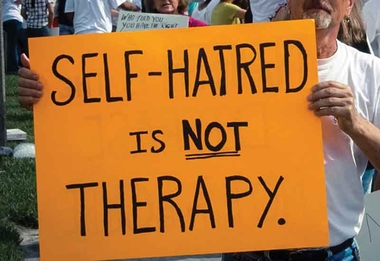Criminalized by my temptations

What I learned from conversion therapy
by Kara Kliewer
Staff Writer
In one of the most difficult seasons of my life, one afternoon I found myself sitting in a dark, religiously-clad room surrounded by my parents and two “ex-gays.” The months leading up to this afternoon had left my head in complete white space. After essentially being outed by my parents to my entire family, my life had been turned upside down.
I was told that conversion therapy was a requirement or I would be kicked out of my living situation and my family’s lives. I had no other living situation and had college and a job to maintain, so I was forced to comply.
I skeptically entered the dimly lit room with my parents for our first “consultation”. Immediately, I could feel the tension. As discussion began, my mother interrupted to spill out what she thought my problems were and why. Word after word hit me like punches, leaving me in tears.
Soon, the “ex-lesbian” counselor took me aside as a way of separating me from the slander. She reassured me that my mother’s behavior wasn’t acceptable; that I shouldn’t feel criminalized by my temptations.
As counseling began my confusion about my sexuality only grew. Outside of reach from family and my counselor, I was new to the “gay” thing. I flirted with and dated girls. However, I still had to suppress my feelings and lie to maintain a somewhat secure life.
Each session, my counselor would approach me with a very relaxed and kind demeanor. Because of this, it was hard not to trust her intentions. She explained her past as one dotted with bitterness towards men and full of the brand of angry feminism that many find off-putting. Her escape from this past life? Jesus.
Not a hateful Jesus, but a compassionate Jesus who deeply cared about me and wanted me to be whole via a heterosexual relationship.
In my free time, I read the counselor’s materials (conversion stories mostly) as well as materials from gay Christians. I wanted a well-rounded understanding as I knew my decision would change the course of my life.
As counseling continued, I didn’t find it extremely abusive, and I wasn’t irreparably damaged, but the compassion painted message was venomous. Soon, I became aware that the hours spent trying to understand my relationships with God and family were a cover for finding the “root” of my homosexuality.
Could it have been the overly legalistic and off-putting Christian high school? Sometimes complicated relationships with family? Or boyfriends who didn’t really match my personality?
To understand why a person falls within the LGBT+ label is to understand that no “root” exists. Human sexuality and spirituality are extremely complex and it takes self-confidence, self-understanding and self-empowerment to live a self-actualized life.
As I grew to understand myself, I found peace with my spirituality and sexuality. I continued working, going to school, secured a new living situation, moved out of my past life and began anew. Though trying, it was the best decision I’ve made, and it forced me to grow up and into the person I was meant to be.
Why does my story matter? Only eight states and the District of Columbia, as well as 23 cities/counties have laws protecting youth from being forced into conversion therapy.
So youth in the rest of the country are still being forced into conversion therapy, which can cause irreparable damage both physically and mentally.
In fact, LGBT+ youth that feel rejected by family/caregivers are more likely to encounter problems with suicidal tendencies, depression, homelessness, STDs and more.

Beyond this, no conclusive studies have ever shown that conversion therapy even works. In fact, “all of the nation’s leading professional medical and mental health associations have rejected conversion therapy as unnecessary, ineffective and dangerous,” according to the National Center for Lesbian Rights.
Parents and guardians are encouraged to seek helpful and healthy alternatives and attitudes instead; educational services, increase in support, etc.
Ultimately, it is quite clear to me that the problem doesn’t lie within the LGBT+ individual. It lies within those who use their influence in the individual’s life to convince them that they are sick and in need of a cure, when, in fact, they are completely whole.
http://www.hrc.org/resources/the-lies-and-dangers-of-reparative-therapy
http://www.nclrights.org/bornperfect-the-facts-about-conversion-therapy/
Copyright The Gayly – September 21, 2017 @ 9:45 a.m. CDT.





